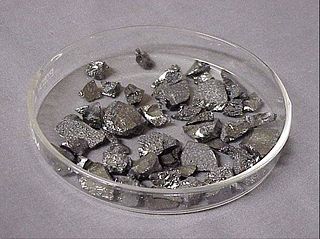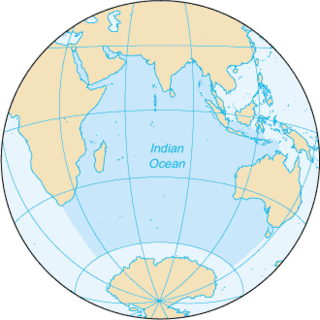
Agriculture or farming is the practice of cultivating plants and livestock. Agriculture was the key development in the rise of sedentary human civilization, whereby farming of domesticated species created food surpluses that enabled people to live in cities. The history of agriculture began thousands of years ago. After gathering wild grains beginning at least 105,000 years ago, nascent farmers began to plant them around 11,500 years ago. Pigs, sheep, and cattle were domesticated over 10,000 years ago. Plants were independently cultivated in at least 11 regions of the world. Industrial agriculture based on large-scale monoculture in the twentieth century came to dominate agricultural output, though about 2 billion people still depended on subsistence agriculture.

Boron is a chemical element with the symbol B and atomic number 5. In its crystalline form it is a brittle, dark, lustrous metalloid; in its amorphous form it is a brown powder. As the lightest element of the boron group it has three valence electrons for forming covalent bonds, resulting in many compounds such as boric acid, the mineral sodium borate, and the ultra-hard crystals of boron carbide and boron nitride.

The Indian Ocean is the third-largest of the world's five oceanic divisions, covering 70,560,000 km2 (27,240,000 sq mi) or ~19.8% of the water on Earth's surface. It is bounded by Asia to the north, Africa to the west and Australia to the east. To the south it is bounded by the Southern Ocean or Antarctica, depending on the definition in use. Along its core, the Indian Ocean has some large marginal or regional seas such as the Arabian Sea, the Laccadive Sea, the Somali Sea, Bay of Bengal, and the Andaman Sea.

A volcano is a rupture in the crust of a planetary-mass object, such as Earth, that allows hot lava, volcanic ash, and gases to escape from a magma chamber below the surface.

Surgery is a medical or dental specialty that uses operative manual and instrumental techniques on a person to investigate or treat a pathological condition such as a disease or injury, to help improve bodily function, appearance, or to repair unwanted ruptured areas.

The Group of Eight (G8) was an inter-governmental political forum from 1997 until 2014. It had formed from incorporating the country of Russia into the Group of Seven, or G7, and returned to its previous name after Russia was removed in 2014.

Vodafone Group Plc is a British multinational telecommunications company. Its registered office and global headquarters are in Newbury, Berkshire, England. It predominantly operates services in Asia, Africa, Europe, and Oceania.

The Gulfstream G550 is a business jet aircraft produced by General Dynamics' Gulfstream Aerospace unit in Savannah, Georgia, US. The certification designation is GV-SP. A version with reduced fuel capacity was marketed as the G500. Gulfstream ceased production of the G550 in July 2021.

The Group of Seven (G7) is an inter-governmental political forum consisting of Canada, France, Germany, Italy, Japan, the United Kingdom and the United States. In addition, the European Union is a 'non-enumerated member'. Its members are the world's largest IMF advanced economies and wealthiest liberal democracies; the group is officially organized around shared values of pluralism and representative government. As of 2020, the collective group accounts for over 50 percent of global net wealth, 32 to 46 percent of global gross domestic product, and approximately 770 million people or 10 percent of the world's population. Members are great powers in global affairs and maintain mutually close political, economic, social, legal, environmental, military, religious, cultural, and diplomatic relations. From 2022, Germany has taken over the rotating presidency of the G7, following the presidency of the United Kingdom.
An environmental factor, ecological factor or eco factor is any factor, abiotic or biotic, that influences living organisms. Abiotic factors include ambient temperature, amount of sunlight, and pH of the water soil in which an organism lives. Biotic factors would include the availability of food organisms and the presence of biological specificity, competitors, predators, and parasites.
The Early Cretaceous or the Lower Cretaceous, is the earlier or lower of the two major divisions of the Cretaceous. It is usually considered to stretch from 145 Ma to 100.5 Ma.

The G20 or Group of Twenty is an intergovernmental forum comprising 19 countries and the European Union (EU). It works to address major issues related to the global economy, such as international financial stability, climate change mitigation, and sustainable development.

Contemporary climate change includes both global warming and its impacts on Earth's weather patterns. There have been previous periods of climate change, but the current changes are distinctly more rapid and not due to natural causes. Instead, they are caused by the emission of greenhouse gases, mostly carbon dioxide and methane. Burning fossil fuels for energy use creates most of these emissions. Certain agricultural practices, industrial processes, and forest loss are additional sources. Greenhouse gases are transparent to sunlight, allowing it through to heat the Earth's surface. When the Earth emits that heat as infrared radiation the gases absorb it, trapping the heat near the Earth's surface. As the planet heats up it causes changes like the loss of sunlight-reflecting snow cover, amplifying global warming.

WSP Global Inc. is a Canadian company with American and British roots, providing management and consultancy services to the built and natural environment. It is listed on the Toronto Stock Exchange. After the purchase of New York-headquartered professional services firm Parsons Brinckerhoff in October 2014, WSP Global effectively became one of the largest professional services firms in the world, with approximately 47,000 employees in 500 offices serving in 40 countries.

Urodidae or "false burnet moths" is a family of moths in the lepidopteran order. It is the type genus in the superfamily, Urodoidea, with three genera, one of which, Wockia, occurs in Europe.
The Paleocene, or Palaeocene, is a geological epoch that lasted from about 66 to 56 million years ago (mya). It is the first epoch of the Paleogene Period in the modern Cenozoic Era. The name is a combination of the Ancient Greek παλαιός palaiós meaning "old" and the Eocene Epoch, translating to "the old part of the Eocene".

Preneopogon is a genus of moths of the family Crambidae.

While the future can never be predicted with certainty, present understanding in various scientific fields allows for the prediction of some far-future events, if only in the broadest outline. These fields include astrophysics, which studies how planets and stars form, interact, and die; particle physics, which has revealed how matter behaves at the smallest scales; evolutionary biology, which predicts how life will evolve over time; plate tectonics, which shows how continents shift over millennia; and sociology, which examines how human societies and cultures evolve.
The Australasian Virtual Herbarium (AVH) is an online resource that allows access to plant specimen data held by various Australian and New Zealand herbaria. It is part of the Atlas of Living Australia (ALA), and was formed by the amalgamation of Australia's Virtual Herbarium and NZ Virtual Herbarium. As of 12 August 2014, more than five million specimens of the 8 million and upwards specimens available from participating institutions have been databased.















